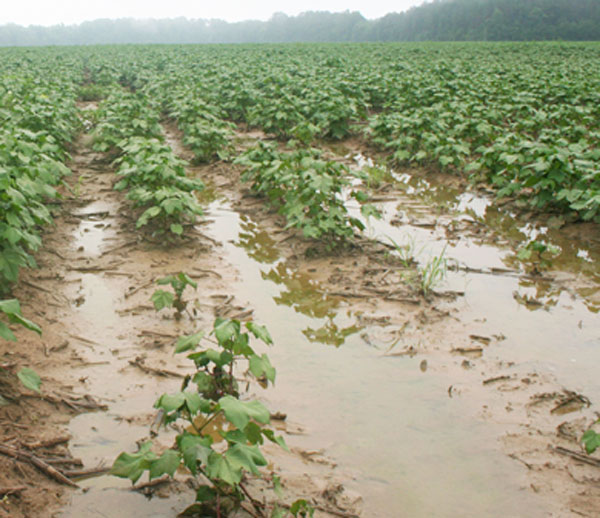September 23, 2013

Farmers in 50 Alabama counties are now eligible for assistance from the U.S. Department of Agriculture’s (USDA) Farm Service Agency (FSA) because of natural disasters.
The USDA declared those counties “primary natural disaster areas” Sept. 18 because of excessive rainfall and flooding in 2013, which heavily damaged some crops.
“The 2013 growing season brought near-record rainfall to the state,” said Alabama Farmers Federation Cotton, Soybean and Wheat & Feed Grains Division Director Buddy Adamson. “While it was a blessing for some farmers, it was a nightmare for others whose crops were flooded out or whose seed never sprouted because of too much rain.
“This declaration will help those farmers apply for emergency loans to replace the income that washed away with the rain.”
Gov. Robert Bentley requested the designation from the USDA in August. “It’s important that we connect farmers with every resource available following the excessive rain and flooding we’ve seen this year,” Bentley said.
“I appreciate USDA Secretary Thomas Vilsack for recognizing the losses in counties across Alabama and for making assistance available.”
The 50 counties covered by the primary natural disaster designation are: Autauga, Baldwin, Barbour, Blount, Bullock, Calhoun, Cherokee, Chilton, Choctaw, Clarke, Cleburne, Coosa, Covington, Crenshaw, Cullman, Dale, Dallas, Elmore, Etowah, Fayette, Geneva, Greene, Hale, Henry, Houston, Jackson, Jefferson, Lamar, Lauderdale, Lowndes, Macon ,Madison, Marengo, Mobile, Monroe, Montgomery, Morgan, Perry, Pickens, Pike, Russell, St. Clair, Shelby, Sumter, Talladega, Tallapoosa, Tuscaloosa, Walker, Washington and Wilcox.
Farmers in eligible counties have eight months to apply for assistance, which includes FSA emergency loans. Applications will be evaluated individually based on direct production losses.
The USDA declared the following 16 counties as “contiguous disaster counties:” Bibb, Butler, Chambers, Clay, Coffee, Colbert, Conecuh, DeKalb, Escambia, Lawrence, Lee, Limestone, Marion, Marshall, Randolph and Winston. Farmers in these areas may also apply for assistance,
Find contact information for local USDA service centers at http://1.usa.gov/mzFcRd.
You May Also Like




